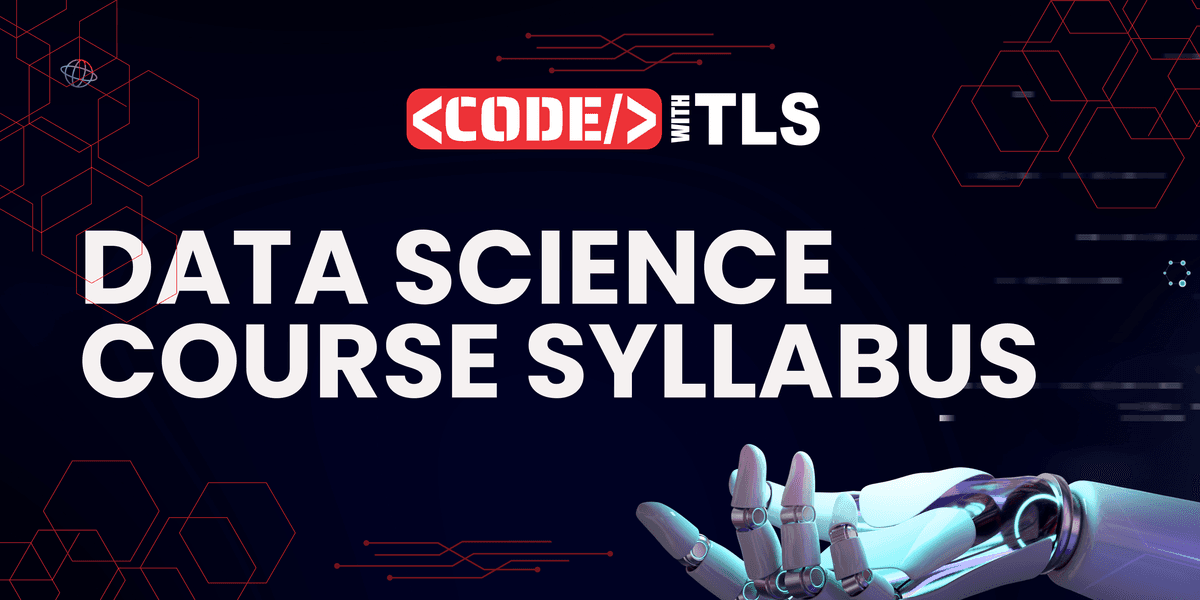

Master Data Science with Our Detailed Course Syllabus and Content
Published: 2024-12-05 11:39:40
Mastering data science opens doors to high-demand careers in technology, analytics, and AI. At Code with TLS, our comprehensive Data Science course syllabus is designed to provide both beginners and professionals with a solid foundation in the core data science subjects. This industry-focused program covers the data science course syllabus for beginners, guiding you through essential topics step by step.
Whether you're interested in learning Python, working on real-world projects, or diving deep into statistics and machine learning, our data science course curriculum ensures you’re well-prepared for every challenge. The syllabus of data science includes hands-on modules such as data science with Python course syllabus, data visualization, and machine learning models, along with the complete maths syllabus for data science and statistics syllabus for data science.
We’ve designed this data science course description to reflect the latest industry requirements in India and beyond. So, if you're asking “What is the data science course syllabus?” or exploring the data science course syllabus in India, this guide covers all the data science course topics, key concepts, and tools used by top data scientists today.
From foundational concepts to advanced analytics, our data science courses syllabus outlines everything you need—including the data scientist course syllabus, data science subject syllabus, and full data science course outline. Explore what the data science course includes and gain the confidence to solve complex problems with data.
Get ready to learn, practice, and future-proof your career with Code with TLS’s expert-led curriculum and cutting-edge training.
Best Coding Bootcamps in India – Top Picks for 2025
Data Science Course Syllabus: A Deep Dive into Core and Advanced Topics
Data Science is one of the most dynamic and rapidly expanding fields in the modern tech-driven world. It has grown significantly in the past decade, revolutionizing industries by providing valuable insights from large datasets to help organizations make better decisions.
As companies and individuals increasingly rely on data-driven strategies, the demand for skilled data scientists has skyrocketed, making data science education a highly sought-after pursuit.
Introduction to Data Science Course Syllabus
A Data Science course syllabus typically encompasses a broad range of topics designed to equip students with the knowledge and skills necessary for handling, analyzing, and interpreting data.
The course material will often cover both the theoretical concepts and practical applications of data science, including how to leverage various tools and algorithms to process and analyze data effectively.
Advanced Full‑Stack Developer Course in Delhi – Enroll 2025
Broad Range of Topics
A Data Science course syllabus typically covers a variety of subjects, equipping students with the essential knowledge and skills for handling, analyzing, and interpreting data.
Theoretical & Practical Applications
The course material balances theoretical concepts with practical applications, teaching students how to leverage tools and algorithms for effective data analysis.
Interdisciplinary Nature
Data science integrates mathematics, computer science, statistics, and domain expertise, ensuring students learn a blend of theory and hands-on practical skills.
Core Skills
The syllabus focuses on core skills such as statistical analysis, machine learning, data visualization, and programming languages like Python and R.
Foundational to Advanced Topics
The course begins with foundational concepts and gradually progresses to more advanced topics such as Big Data, Deep Learning, and AI integration, providing a comprehensive understanding of the field.
Also Must Read Blogs:
Top Data Science Jobs in India
Data Science Course Eligibility
Core Topics in Data Science Course Syllabus
The core topics form the foundation of data science education. These areas provide the essential skills that all data scientists need to master, regardless of their specialization. Let's dive deeper into each of these key areas:
1. Statistics
Statistics is the backbone of data science, as it helps in making sense of the data and drawing meaningful conclusions. A solid understanding of statistics is crucial for tasks like hypothesis testing, sampling, and probability analysis. Some of the key statistical concepts covered in data science courses include:
- Descriptive statistics: Mean, median, mode, variance, standard deviation
- Inferential statistics: Sampling, confidence intervals, hypothesis testing, p-values
- Probability theory: Conditional probability, distributions (e.g., normal, binomial, Poisson)
- Regression analysis: Linear regression, logistic regression, and multivariate regression
By learning these concepts, data scientists are able to understand the patterns within the data and use statistical methods to draw valid conclusions.
Best Programming Languages to Learn in 2025
2. Machine Learning
Machine learning is a crucial area of data science, enabling data scientists to create predictive models. It is an advanced subset of artificial intelligence (AI) that allows machines to learn from data and improve over time. Data science courses will generally include the following machine learning topics:
- Supervised learning: This involves algorithms like linear regression, decision trees, and support vector machines, where the model is trained on labeled data.
- Unsupervised learning: Algorithms such as k-means clustering and hierarchical clustering, which find hidden patterns or groupings in data without labeled outputs.
- Reinforcement learning: Techniques where the algorithm learns by interacting with an environment to maximize a reward function.
- Model evaluation: Techniques like cross-validation, confusion matrix, and performance metrics (e.g., precision, recall, F1-score).
By the end of the course, students should be able to develop and evaluate machine learning models for various business and research applications.
3. Python/R Programming
Programming languages, especially Python and R, are vital for implementing data science algorithms and working with data. Both languages are widely used in the field of data science due to their versatility and strong library support. A data science syllabus will typically cover:
- Python: Python is known for its simplicity and readability. Data scientists use Python for data manipulation (using libraries like Pandas), numerical computing (using NumPy), machine learning (using Scikit-learn), and data visualization (using Matplotlib and Seaborn).
- R: R is especially popular in the academic world and for statistical analysis. It offers powerful data visualization and statistical analysis capabilities with packages like ggplot2, dplyr, and tidyr.
Both languages are taught in data science courses, but depending on the course structure, students may focus on one over the other or learn both.
Skills Required for AI and Machine Learning – 2025 Guide
4. Data Visualization
Data visualization is an essential skill for any data scientist, as it allows you to communicate findings effectively to non-technical stakeholders.
Visualizations make complex data more accessible, helping decision-makers quickly grasp insights. Effective data visualization allows data scientists to convey insights in a manner that is easy to interpret, making it an indispensable skill in the industry.
Advanced Topics in Data Science Course Syllabus
Once students have a strong foundation in core data science topics, advanced subjects help them gain expertise in specific, high-demand areas. These advanced topics include Big Data, Deep Learning, and AI integration.
1. Big Data
Big Data refers to datasets that are too large or complex to be handled by traditional data processing methods. As organizations collect more data than ever before, understanding how to process and analyze Big Data has become essential. Topics covered may include:
- Hadoop: A framework for distributed storage and processing of large datasets.
- Spark: An open-source unified analytics engine for Big Data processing.
- NoSQL Databases: Understanding database systems like MongoDB and Cassandra, which are designed to handle unstructured data.
- Distributed computing: Concepts of parallel computing and distributed storage for faster data processing.
Big Data technologies are crucial for working with massive datasets and real-time data analytics, making it a vital part of the modern data science syllabus.
Data Science Course Syllabus – Complete Breakdown 2025
2. Deep Learning
Deep learning is a subset of machine learning that uses neural networks with many layers (also known as deep neural networks) to model complex patterns in data. Topics covered may include:
- Artificial neural networks (ANNs): The fundamental building blocks of deep learning, simulating the human brain's network of neurons.
- Convolutional Neural Networks (CNNs): Mainly used for image recognition and classification tasks.
- Recurrent Neural Networks (RNNs): Ideal for sequential data like time series or natural language processing.
- Generative models: Such as GANs (Generative Adversarial Networks), which are used for generating synthetic data.
Deep learning is especially important in fields like computer vision, natural language processing, and autonomous systems.
3. AI Integration
AI (Artificial Intelligence) is a broader concept that involves developing systems capable of performing tasks that typically require human intelligence, such as decision-making, speech recognition, and visual perception. Key topics include:
- AI algorithms: The study of algorithms that simulate human decision-making, including decision trees, game theory, and logic-based systems.
- Natural Language Processing (NLP): Techniques for enabling computers to understand and process human language.
- AI in business applications: Using AI for optimization, recommendation systems, and personalized marketing.
Data Science Course with Fees – 2025 Fee Guide
The integration of AI within data science workflows enables powerful predictive analytics, intelligent automation, and much more.
Read More:
Benefits of Digital Marketing Course
Best Digital Marketing Course in India
Best Digital Marketing Institute in Delhi
Best Mobile App Development Course
Best Mobile App Development Course Certification
Best Programming Languages to Learn 2025
Importance of Project Work in Data Science Syllabus
Project work is an essential component of any data science syllabus. It allows students to apply the theoretical concepts they’ve learned in real-world scenarios. By working on capstone projects, learners can:
- Demonstrate Practical Skills: Project work allows students to showcase their ability to process, analyze, and interpret data.
- Build a Portfolio: A strong project portfolio is crucial for job seekers. It demonstrates your ability to solve complex problems and provides concrete examples of your work.
- Collaborative Learning: Many data science courses involve group projects, encouraging collaboration and the exchange of ideas, which mirrors the real-world working environment.
Data Science Jobs in India – 2025 Opportunities & Roles
FAQs – Master Data Science with Our Course Syllabus & Content
What topics are covered in your data science course syllabus?
The syllabus includes Python programming, statistics, data visualization, machine learning, deep learning, SQL, big data, and real-world projects.
Is this data science course suitable for beginners?
Yes, the course is designed for both beginners and professionals, starting from foundational concepts and progressing to advanced techniques.
Do you include hands-on projects in the course content?
Absolutely! We provide multiple real-world projects using tools like Python, Pandas, Scikit-learn, TensorFlow, and Power BI to ensure practical learning.
How long does it take to complete the data science course?
The course typically takes 4 to 6 months to complete, depending on your pace and the mode (online or offline).
What tools and programming languages are taught?
You’ll learn Python, R (optional), SQL, Jupyter Notebook, Excel, Tableau, and libraries like NumPy, Matplotlib, Scikit-learn, and TensorFlow.
Is the syllabus updated with current industry trends?
Yes, the course content is regularly updated to include the latest trends in AI, cloud computing, big data, and generative models like ChatGPT.
Do I need a technical background to enroll?
No prior tech background is required. Basic math and logical thinking are enough to start learning data science through our structured curriculum.
Will I get a certificate after completing the course?
Yes, upon successful completion, you’ll receive an industry-recognized certificate to boost your resume and job prospects.
Is placement assistance included with this course?
Yes, we offer 100% placement assistance including resume building, mock interviews, and access to exclusive job portals and partner companies.
Why should I learn data science with Code with TLS?
Code with TLS offers expert mentorship, industry-aligned curriculum, real-time projects, and career support — making it one of the best platforms to master data science in 2025.
Conclusion
The Data Science course syllabus is designed to provide students with a deep understanding of the field, ranging from core topics like statistics, machine learning, Python/R programming, and data visualization to advanced areas like Big Data, Deep Learning, and AI integration.
When choosing a course, comparing syllabi across platforms like Coursera, edX, and Udacity can help you determine which aligns best with your learning goals.
At Code with TLS, we offer a curriculum tailored to ensure you learn the most relevant skills for today’s data science landscape.
Importance of Project Work
Project work plays an indispensable role in cementing your learning, helping you build a portfolio that can be pivotal in landing a job in the competitive data science field. Our students at Code with TLS have the opportunity to work on projects that set them apart in the job market.
How to Join the Best Data Science Course:
Visit Code with TLS Admission or call us for a bootcamp demo.
Contact Us:
918527866980
info@codewithtls.com


